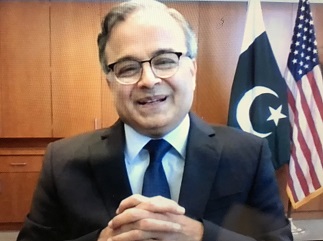Pakistan: The Best Kept Tourism Secret in the World
By Elaine Pasquini

Washington: On February 23, the Embassy of Pakistan, together with the International Friendship Club of Washington, hosted a webinar highlighting Pakistan’s rich cultural heritage and tremendous tourism potential.

Ambassador Asad Majeed Khan
“Some say Pakistan is a well-kept secret when it comes to our economic and tourism potential,” Ambassador Asad Majeed Khan said in his welcoming remarks. Over the past few years, international travel organizations and publications have begun to recognize “the jewel that Pakistan is for various kinds of tourism,” the ambassador pointed out. While the country possesses amazing landscapes, history, culture, and food, most importantly, he said, “I think our warmth and hospitality is our biggest asset.”
Aftab-ur-Rehman Rana, managing director of Pakistan Tourism Development Corporation and president of the Sustainable Tourism Foundation Pakistan, underlined his country’s tourism potential.
“Pakistan is one of those countries in the world which are blessed with a diverse inventory of tourism attractions based on the unique endowment of natural landscape features, biodiversity and rich cultural heritage,” he said.
Rana pointed out the many different kinds of tourism including recreation, adventure, culture, religious, sports, ecotourism, education, food and shopping. With nine ecological zones, there is a great diversity of wildlife that visitors can see on wildlife-watching tours. And along the Makran coast are Pakistan’s scenic sandy beaches.
“Pakistan is where you can find the three great mountain ranges converging: the Karakorams, Himalayas and Hindu Kush,” he explained. “We have some of the tallest mountains in the world – five peaks over 8,000 meters and 102 peaks over 7,000 meters,” which provide opportunities for adventure sports ranging from mountaineering, rock climbing and paragliding to river rafting and snowboarding. “It’s a great landscape and playfield for adventure tourism,” Rana emphasized.
The valleys of the Himalayas with hundreds of stunning lakes are perfect for camping or trekking. “Exploring this wilderness itself is an adventure and has a charm all its own,” he added.
Not to be overlooked, he stressed, are Pakistan’s amazing cities including Peshawar, one of the oldest-living cities in Pakistan, Lahore that has great Mughal heritage, Karachi with its British Raj buildings and Islamabad, the modern capital city.
When you are traveling in Pakistan, Rana exclaimed, “You never feel bored.”
Shaista Mahmood, president of the International Friendship Club in Washington, DC, recalled fond memories of growing up in the very cultured city of Lahore, but noted she had not visited all of the beautiful and historic sites of her native country.
Dr Asma Ibrahim, founder and director of the Museum, Archives and Art Gallery of the State Bank of Pakistan, described the abundance of treasures, historic relics and multicultural heritage of Pakistan.
In the regions of Karachi, Punjab and Chakwal, Pakistan has an “uninterrupted” history, extending from the Stone Age to Mehrgarh (7,000 BC), then to pre-Indus and the site of Kot Diji (3,500 BC) located in Sindh province, she said.
Baluchistan, with its exquisite and unique architecture, temples, tombs and historic fortresses, is a “must to visit,” Ibrahim stated. The province is home to ancient elephant and deer fossils in the rocks of Chakwal, the smaller of which are in the museums, while the larger ones remain available for tourists to view in situ.
“I believe that when you connect with history where it took place something special happens,” she said. “One can read history in books, but being on the spot helps us put the past into context.”
Zain Mustafa, architect, educationist and founder of the Karachi-based Cube Edutours, discussed the UNESCO world heritage site of the Makli necropolis at the archaeological site of Thatta, a few hours from Karachi. With its archeological history and over 150,000 graves, Makli is “not just a cemetery, it’s a magical encyclopedia waiting to be studied with design influences and stone carvings and dye work,” he elaborated.
Mustafa also highlighted Pakistan’s rich history of music and dance which reflect each region’s customs and traditions, and are “the celebration of who they are, where they live – the land, terrain and life’s simple joys in general,” he enthused.
Jean Gardner, professor emeritus of art history and architecture at the New School, NYC, emphasized the importance of visiting ancient sites.
Specifically, she suggested visiting the Kalasha Valleys in order to learn from the residents who have lived there for centuries “how their clothes, festivals, games and language are their identity.”
In conclusion, Ambassador Khan urged viewers to visit this globally relevant and historic region of the world.
“Walking through the streets of Pakistan, walking through different areas of Pakistan, you are actually undertaking a journey through human history and learning about human civilizations,” he said. “This is not just our heritage; this is a common heritage of everyone around the world which makes it even more important and compelling for people to consider coming to Pakistan.”
(Elaine Pasquini is a freelance journalist. Her reports appear in the Washington Report on Middle East Affairs and Nuze.Ink.)
-----------------------------------------------------------------------------
Back to Pakistanlink Homepage

